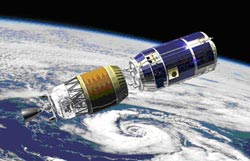NASA buys Japanese cargo ships
The Yomiuri, Japan, said that NASA has begun negotiations on buying Japanese unmanned cargo spacecraft to supply goods to the International Space Station. .
The newspaper also revealed the following information:
This is the biggest negotiation in Japan's 50-year history of space development.
Japan's H-2 Transfer Vehicle (HTV) worth 14 billion yen (131 million USD) is being developed by the Japan Space Exploration Agency (JAXA) and domestic companies, including the Company Mitsubishi Heavy Industries and Mitsubishi Electric Corporation.

Image of the H-2 Transfer Vehicle spacecraft (HTV) of the Japan Space Exploration Agency.( www.spacedev.com )
This US move comes from the situation that NASA is worried that when US shuttles stop working in 2010, it will be difficult for the US to provide water, food and scientific research materials to Tram Vu. International pillar.
Last April, NASA began a project to help US companies develop a spaceship to continue the shuttle's work, but they were unsure whether to deploy the vessel in two years. The rest is not, and this has prompted NASA to discuss buying foreign space ships.
Japan's HTV spacecraft is capable of transporting up to 6 tons of cargo and will be operational by next fall. This spacecraft will be shipped at a rate of one per year.
Although not accessible to JAXA's comments, the Yomiuri cited the space agency's statement that it has begun discussing the issue informally with NASA since February this year.
- Build large cargo ships to save on CO2 emissions
- Russian cargo spacecraft continuously broke the flight time record
- How did cargo ships survive the storm in the sea?
- Successfully launched Dragon cargo ship to ISS
- Rolls-Royce is developing unmanned cargo ships
- Why do most yachts are white while the cargo ships are quite colorful?
- The cargo ship is over 200,000 tons long by four football fields
- Fashion uses sailboats carrying super-weight cargo
- 'Super' unmanned aircraft monitors ships causing pollution
- The photos captivated astronomers last week
- The intact wreck emerged from the sea floor after 200 years of rest
- Cargo ship 'Progress M-61' successfully assembled with the ISS Station
 Van Allen's belt and evidence that the Apollo 11 mission to the Moon was myth
Van Allen's belt and evidence that the Apollo 11 mission to the Moon was myth The levels of civilization in the universe (Kardashev scale)
The levels of civilization in the universe (Kardashev scale) Today Mars, the sun and the Earth are aligned
Today Mars, the sun and the Earth are aligned The Amazon owner announced a secret plan to build a space base for thousands of people
The Amazon owner announced a secret plan to build a space base for thousands of people 'Strange smell' detected on cargo spacecraft to ISS
'Strange smell' detected on cargo spacecraft to ISS  After 4 years of being sent into space by Elon Musk, what is the fate of the $100,000 Tesla Roadster now?
After 4 years of being sent into space by Elon Musk, what is the fate of the $100,000 Tesla Roadster now?  The Shape of the Universe Isn't What You Think: From Ancient Round Sky to Modern Three-Dimensional Donut
The Shape of the Universe Isn't What You Think: From Ancient Round Sky to Modern Three-Dimensional Donut  How to get back to the spacecraft if the astronauts leave the cabin to work and accidentally drift away?
How to get back to the spacecraft if the astronauts leave the cabin to work and accidentally drift away?  Announcement of discovery of micro-asteroid population in the Solar System
Announcement of discovery of micro-asteroid population in the Solar System  Solving 'traffic jams' in space
Solving 'traffic jams' in space 